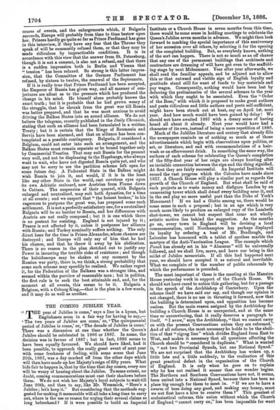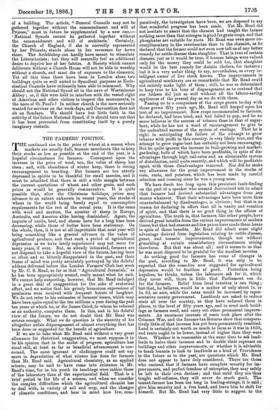THE COMING J U.BILEE YEAR.
44 THE year of Jubilee is come," says a line in a hymn, but
Englishmen seem in a fair way for having to say,— ' The two years of Jubilee are come,' or, 'The quinquennial period of Jubilee is come,' or, 'The decade of Jubilee is come.' There was a discussion at one time whether the Queen's Jubilee should be celebrated in 1886 or 1887. In name, the decision was in favour of 1887 ; but in fact, 1886 seems to have been equally favoured. We should have liked, had it been possible, to approach the really great event of next year with some freshness of feeling, with some sense that June 20th, 1887, was a day marked off from the other days which will then have made up her Majesty's reign of fifty years. What bids fair to happen is, that by the time that day comes, every one will be weary of hearing about the Jubilee. To some extent, no doubt, coming commemorations must cast their shadows before them. We do not wish her Majesty's loyal subjects to wait till June 20th, and then to say, like Mr. Wemmick, "Here's a Jubilee ; let's keep it." But considering that the methods sug- gested for making it memorable will all take a long time to carry out, where is the use or reason for urging their several claims so long beforehand ? If it were possible to build an Imperial Institute or a Church House in seven months from this time, there would be some sense in holding meetings to celebrate the Queen's Jubilee seven months in advance. We might then look
forward to marking the special importance of this anniversary of her accession over all others, by selecting it for the opening
of the completed building. But, as everybody knows, nothing of the sort can happen. There is not so much as an off chance that any one of the permanent buildings that architects and contractors are dreaming of will have got even to the scaffold- ing stage by next Midsummer. Year after year afterwards, we shall read the familiar appeals, and be adjured not to allow this or that outward and visible sign of English loyalty and gratitude stand still for want of funds to buy materials and pay wages. Consequently, nothing would have been lost by deferring the preliminaries of the several schemes to the year
with which they ought to be associated. Even the "Order of the Rose," with which it is proposed to make great authors
and poets ridiculous and little authors and poets self-sufficient, might have been struck out at heat, say on April 1st, next year. And how much would have been gained by delay ! We should not have awaited 1887 with a dreary sense of having heard all about it already. Next year would have had a character of its own, instead of being a mere repetition of 1886.
Much of the Jublilee literature and oratory that already fills the newspapers reminds us of nothing so much as of those advertisements which begin with observations upon politics, or art, or literature, and end with recommendations of a hair- wash or an effervescent drink. In something the same way, the authors of each scheme for celebrating the Queen's completion of the fifty-first year of her reign are always hunting after an invisible connection between the sign and the thing signified. At first they are fairly successful. An Imperial Institute will record the vast progress which the Colonies have made since 1837. A Church House will play a similar part as regards the growth of the Church of England. But what shall be said of
such projects as to waste money and disfigure London by an unmeaning tower which shall dwarf every building near it, and in the end play no more useful part than the Duke of York's Monument ? If we had a Giotto among us, there would be some sense in such a proposal ; but in an age which is very much more likely to produce an enlarged copy of the Lambeth shot-tower, we cannot but suspect that some not wholly artistic motive lies behind the suggestion. As the months go on, every town in England will be devising a local commemoration, until Northampton has perhaps displayed its loyalty by ordering a bust of Mr. Bradlaugh, and Leicester has honoured with a tablet of spotless marble the martyrs of the Anti-Vaccination League. The example which Punch has already set in his "Almanac" will be universally followed, and we shall live, move, and have our being in the midst of Jubilee memorials. If all this had happened next year, we should have accepted it as natural and inevitable. What we complain of is the number of public rehearsals by which the performance is preceded.
The most important of these is the meeting at the Mansion House yesterday week in support of the Church House. We should not have cared to notice this gathering, but for a passage in the speech of the Archbishop of Canterbury. Upon the scheme itself we have said our say, and though our opinion is not changed, there is no use in thrusting it forward, now that the building is determined upon, and opposition has become useless. But the main reason assigned by the Archbishop for building a Church House is so unexpected, and at the same time so unconvincing, that it really deserves a paragraph to itself. "I avow," says the Archbishop," that we cannot carry on with the present Convocations unless they are reformed." And of all reforms, the most necessary he holds to be the aboli- tion of that "zigzag line" which divides England from East to West, and makes it necessary that all questions affecting the Church should be "considered in duplicate." What is wanted is, "not two Provincial Synods, but one National Synod." We are not surprised that the Archbishop has woken up, a little late and a little suddenly, to the realisation of this great practical defect in the organisation of the Church of England. It is only when he goes on to explain why he has not realised it sooner that our wonder begins. The Northern and Southern Convocations have not, it seems, been united into a National Synod, because there has been no place big enough for them to meet in. "If we are to have a swarm of bees doing any good, and making any honey, must we not first have a hive to receive them ?" This greatest of ecclesiastical reforms, this union without which the Church of England "cannot carry on," has been impossible for want
of a building. The article, "General Councils may not be gathered together without the commandment and will of Princes," must in future be supplemented by a new one,— 'National Synods cannot be gathered together without the commandment and will of architects.' Certainly, the Church of England, if she is correctly represented by her Primate, stands alone in her reverence for hewn stone. The Archbishop can hardly have meant to stimulate the Liberationists ; but they will assuredly feel an additional desire to deprive her of her fabrics. A Society which cannot deliberate without a Church House will not be able to worship without a church, and must die of exposure to the elements. Yet all this time there have been in London alone two buildings quite as well suited to Synodical purposes as Eccle- siastical Councils have ordinarily been able to command. Why should not the National Synod sit in the nave of Westminster Abbey ; or, if this were held to interfere with the vested right of American and other visitors to inspect the monuments, in the nave of St. Paul's ? In neither church is the nave seriously wanted for services on the week-days, and Convocation does not sit on Sundays. We should have but little faith in the activity of the future National Synod, if it should turn out that it has been prevented from constituting itself by a purely imaginary obstacle.











































 Previous page
Previous page